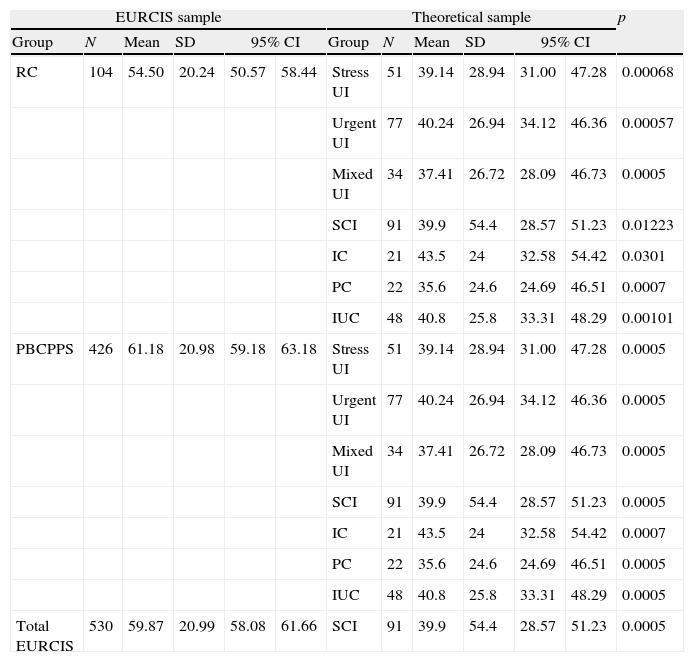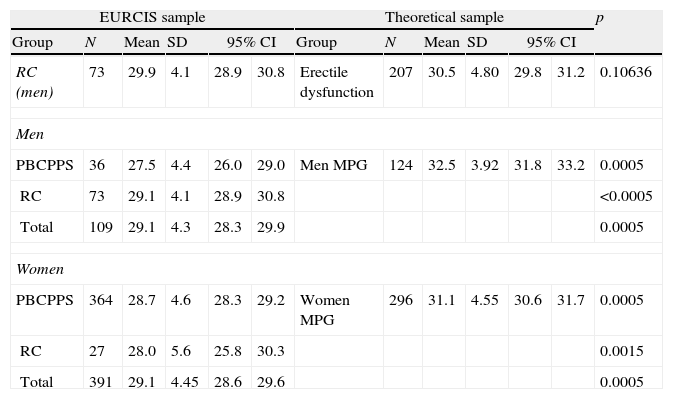To evaluate the impact of urinary symptoms of Painful Bladder/Pelvic Pain Syndrome and Radiation Cystitis (PBCPPS) on the Quality of Life, and self-esteem of the patient.
Material and methodsAn observational, multicenter, epidemiological and cross-sectional study was performed on patients with Painful Bladder/Chronic Pelvic Pain Syndrome and Radiation Cystitis. Data were recorded on severity of urinary symptoms and QoL impairment using the PUF Score. The patients evaluated the QoL deterioration grade through the King's Health Questionnaire (KHQ), and the level of their anxiety and self-esteem with the Goldberg Anxiety Scale (GAS) and Rosenberg Self-Esteem Scale (RSES), respectively. Post hoc comparisons were performed between the results of the KHQ of this study and a sample of patients with urinary incontinence (UI). Results on RSES were analyzed with data from the general population and from patients with erectile dysfunction.
ResultsA total of 530 cases, mostly female patients, who had been diagnosed with PBCPPS, were analyzed. High levels of deterioration in QoL were described: KHQ scores were significantly higher when compared with patients with UI (p<0.01). Involvement of self-esteem was higher in patients with RC and men, who obtained scores similar to those of patients with erectile dysfunction.
ConclusionsPatients with Painful Bladder Syndrome/Chronic Pelvic Pain Syndrome and Radiation Cystitis present high levels of anxiety, and significant reductions in both quality of life and self-esteem. Especially for men, this affectation is similar to that caused by erectile dysfunction.
Evaluar el impacto que tiene la sintomatología urinaria secundaria a síndrome de vejiga dolorosa/dolor pélvico crónico (SVDPC) y cistitis rádica (CR) en la calidad de vida (CV) y la autoestima del paciente.
Material y métodosEstudio observacional epidemiológico transversal multicéntrico en pacientes con cuadros de SVDPC o CR. Se registraron datos acerca de la gravedad de los síntomas urinarios con la escala PUF. Los pacientes valoraron el grado de deterioro de su CV por medio del cuestionario de salud de King (CSK), así como su nivel de ansiedad y autoestima mediante las escalas de Goldberg y de Rosenberg (EAR), respectivamente. Los resultados del CSK se compararon post hoc con una muestra de pacientes con incontinencia urinaria (IU), mientras que los de la EAR se analizaron frente a los obtenidos en población general y pacientes con disfunción eréctil.
ResultadosSe analizaron un total de 530 casos de pacientes, en su mayoría del sexo femenino y con diagnóstico de SVDPC. Se describieron niveles altos de deterioro en la CV en la mayoría de pacientes, con puntuaciones del CSK significativamente mayores en comparación con las muestras de pacientes con IU (p<0,01). La afectación en la autoestima fue mayor en pacientes con CR y en hombres, que obtuvieron puntuaciones similares a las de pacientes con disfunción eréctil.
ConclusionesLos pacientes con SVDPC y CR, además de tener niveles elevados de ansiedad, presentan disminuciones significativas tanto en la CV como en la autoestima que, particularmente para los varones, es similar a la producida por la disfunción eréctil.












